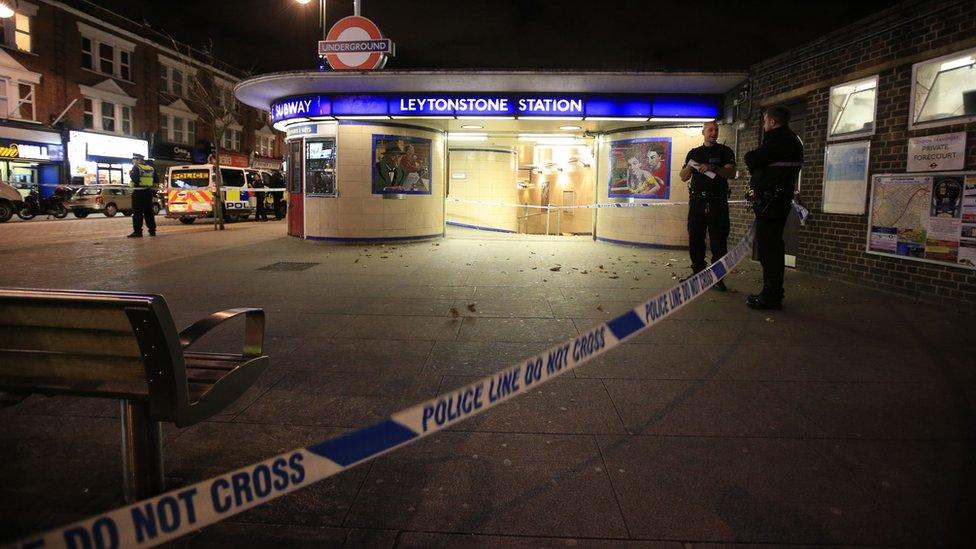Leytonstone Tube knife attacker guilty of murder bid
- Published
BBC News looks at how the attack unfolded
A man who attacked Tube passengers with a knife at Leytonstone station in east London has been found guilty of attempted murder.
Muhiddin Mire, 30, injured musician Lyle Zimmerman, 56, in the station's ticket hall last December.
Somali-born Mire admitted the attack but denied attempted murder.
Mr Zimmerman suffered "a deep and ragged wound" to his neck and his windpipe was exposed, the Old Bailey jury heard.
Video of the attack was shown to the jury
Mire, of Sansom Road, Leytonstone, threatened four other travellers as he ran amok through the station.
The minicab driver had already admitted four counts of attempted wounding and an alternative count of wounding with intent to cause Mr Zimmerman grievous bodily harm.
'Ain't no Muslim'
The attack was caught on CCTV and mobile phone footage taken by a passer-by who carried on filming even as Mire lunged at him with his knife.
Mire claimed he was carrying out the attack for "my Syrian brothers", prompting one onlooker to shout: "You ain't no Muslim, bruv".
Police officers shot Mire with a Taser and arrested him.
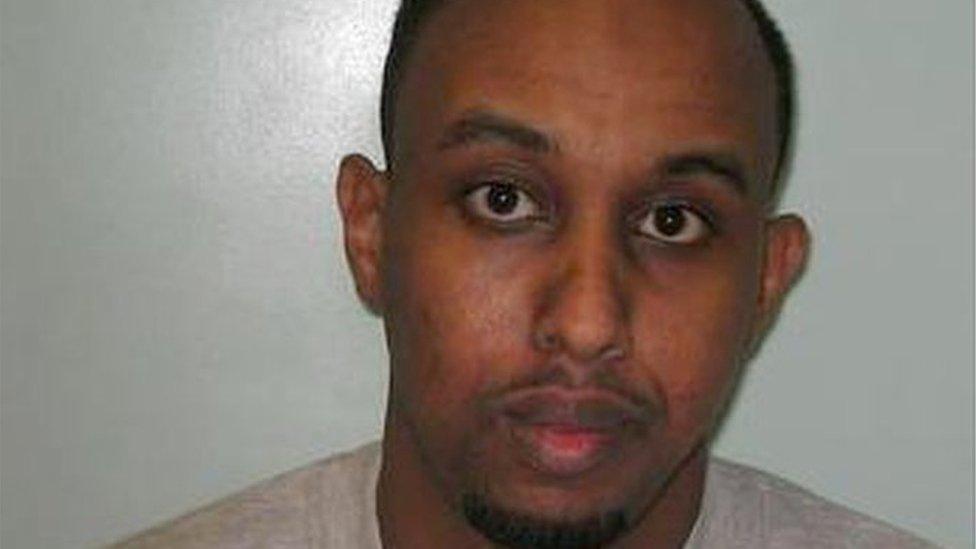
Muhiddin Mire was found guilty of attempted murder
The Old Bailey jury heard Mire had a history of mental illness and that he believed he was being watched by the security services and persecuted because he was a Muslim.
Mire had images of soldier Lee Rigby and the Islamic State (IS) group's British executioner Jihadi John on his mobile phone, along with material linked to IS.
The defendant stared ahead with a blank expression as the jury returned its verdict after little more than a day of deliberations.
Mire was remanded in custody at Broadmoor secure psychiatric hospital and will be sentenced at the end of July.
After the conclusion of the trial, Transport for London confirmed Mire had gained a private hire licence after "satisfactorily" completing a Disclosure and Barring Service and health checks - part of which include a medical assessment with a registered practitioner who had full access to medical records.
Cowboy boots
Before adjourning for sentencing, Judge Nicholas Hilliard QC told jurors he would be highlighting the "public spiritedness" of the people who rushed in to help on the day of the attack.
He said: "It would have been very easy to continue one's journey on, but that did not happen."
The jury heard that on 5 December, Mr Zimmerman had been singled out by Mire as they both travelled on the same train.
Mr Zimmerman was wearing cowboy boots and a hat. He was carrying a mandolin and an amplifier and had a guitar strapped to his back.
Mire followed him off the tube train and attacked him with a black-handled knife as they reached the ticket barriers.
Grabbing Mr Zimmerman from behind, Mire swung his victim to the floor before kicking him repeatedly as a woman nearby called out to him to stop.
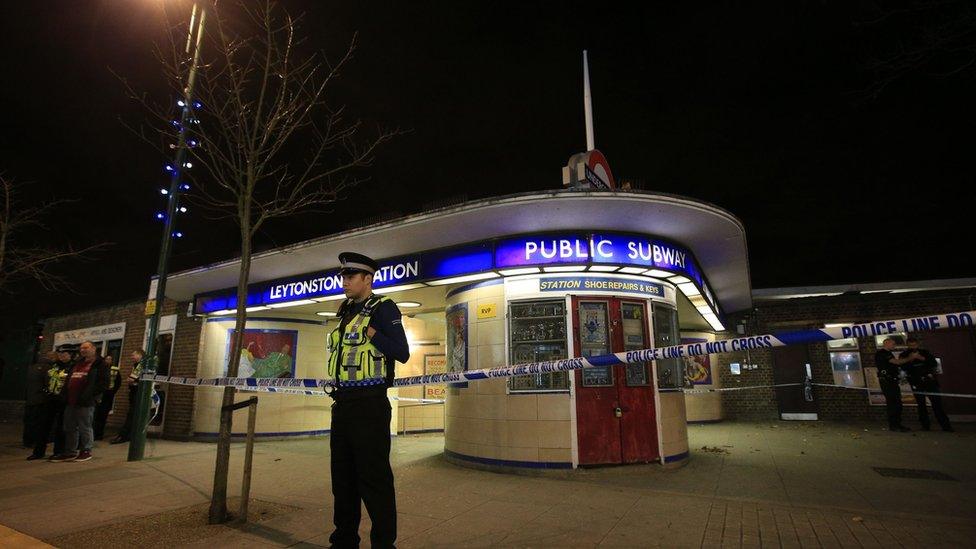
The jury was shown footage filmed by a passenger that featured the defendant brandishing the knife seconds before he attacked Lyle Zimmerman
As Mr Zimmerman lay defenceless on the ground, Mire crouched down and attacked him with the knife in front of horrified passengers.
Giving evidence from behind a screen, Mr Zimmerman told the jury: "At the time, my subjective impression was that I was being attacked by a crazy person, a mentally unwell person."
Following the attack on Mr Zimmerman, Mire threatened several more members of the public, swinging his blade at Daniel Bielinski who began filming events on his mobile phone.
Mire then went on to lash out at Serena Valori and an unknown man before coming face-to-face with Russian security guard Andrius Sabaliauskas, who tried to talk to him.
Meanwhile, a junior doctor on his way home rushed to treat the neck wounds of Mr Zimmerman.
Despite efforts to calm him down, Mire tried to slash lift engineer David Pethers before police arrived.
Lone atrocities
Mire ran at one of the police officers, shouting: "This is for my Syrian brothers, I'm going to spill your blood," before he was finally subdued.
The court heard how Mire had been referred to mental health services by his GP a month before the attack.
Mire's family had also become concerned about his mental health and tried unsuccessfully to persuade him to travel back to Somalia.
Commander Dean Haydon, head of Scotland Yard's Counter Terrorism Command, said Mire had been influenced by extremists.
He said: "I would class Mire as being part of a vulnerable section of the community, and terrorist organisations such as Daesh, or IS, over in Syria, prey on individuals such as him.
"And what we found following his arrest is, certainly from his mobile phone and other digital media, that he had downloaded a vast amount of extremist material which we think certainly inspired him to conduct an attack here."
He added much of the material was aimed at the vulnerable to inspire lone atrocities by so-called "spontaneous volatile extremists".
"If you look at some of the propaganda that's coming out of IS and Syria and elsewhere, part of their propaganda is specifically targeted in relation to the vulnerable.
"We're not just talking about mental health here, we're talking about vulnerable individuals within the community," Commander Haydon said.
Mire was found to have started downloading extremist material two or three months before the attack, coinciding with his mental health crisis.
- Published8 June 2016
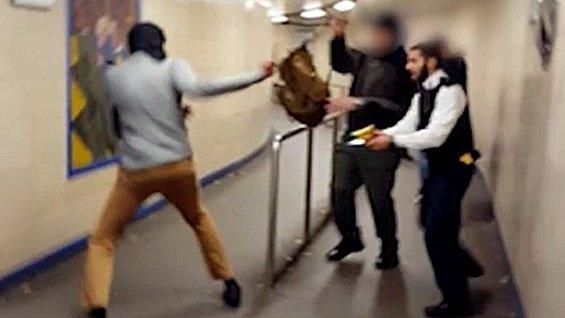
- Published6 December 2015
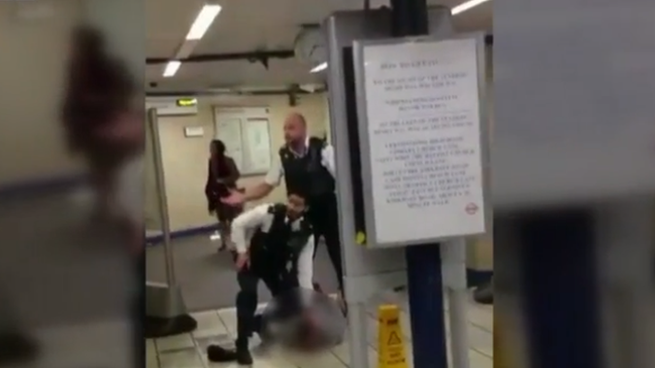
- Published24 May 2016
